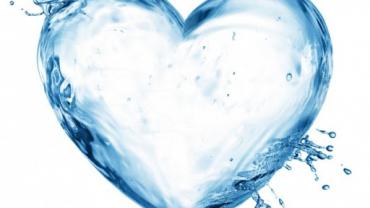
Pure water is the world's first and foremost medicine. Slovakian Proverb
With a flood of drink alternatives on the market today mild dehydration is quickly becoming the norm rather than the exception. In fact an analysis of the 2005 to 2010 NHANES data revealed that 75 percent of children 4 to 8 years old 87 percent of girls 9 to 13 years old and 85 percent of boys 9 to 13 years old did not meet the daily reference intake for total water. We are often told to drink our six to eight glasses of water each day but for some this seems to have become a passing clich© as many reach for juice soda milk tea and coffee while ignoring plain old water. Thinking these alternatives will serve the same purpose many fail to recognize these hyperosmotic solutions may actually accomplish the opposite and contribute to mild dehydration. Strangely we are not hearing about the multitude of chronic health conditions that are impacted by the lack of something as simple as water. Signs of dehydration are often overlooked in lab tests and only when extreme dehydration is noted through external signs do some practitioners stop and consider whether a patient's state of hydration is affecting their health. As children and adults alike are being drawn away from water toward the commercialized beverages it is of the utmost importance that we become aware of the health effects of mild dehydration.
Mental Health
When considering the fact that 77 to 78 percent of brain matter is water it's logical to assume that a lack of adequate hydration would impact mental health and performance. Recent studies have supported the idea that mild dehydration can alter cognitive performance and mood in children adults and the elderly. Concentration alertness short-term memory perceptual discrimination visuomotor tracking (the coordination of movement and visual perception by the brain) and psychomotor skills have all been shown to be mildly to moderately influenced by hydration status. Furthermore dehydration is an underlying risk factor for states of confusion or delirium (perhaps even presenting as dementia) among the elderly population. A natural phenomenon of aging includes a diminished thirst sensation placing the aging population at higher risk for dehydration. With milk juice and soda being popular beverage choices among school-age children it is important to assess adequate hydration when cognitive issues arise. Many adults have migrated to sodas and coffee leaving them dehydrated sluggish mentally challenged and victims of frequent headaches. Proper water intake should be assessed in these individuals as well.
Pulmonary Health
Perhaps the most well known link between hydration and pulmonary health is that of dehydration and exercise-induced asthma. While evaporative water loss is thought to be the primary cause of dehydration leading to bronchoconstriction and thus asthma a lack of proper hydration prior to exercise will certainly exacerbate the condition. The lungs rely on adequate hydration to keep the mucosal linings thin improving oxygen exchange. With less than optimal hydration inflammatory factors are triggered and bronchoconstriction ensues. The number of diagnosed asthmatics has been slowly increasing with a higher prevalence among children. Could these statistics correlate with the increase in commercialized beverages that steer children and adults away from drinking the pure water their bodies crave? Perhaps so. Regardless it is vitally important that proper hydration with pure water be maintained for optimally functioning lungs.
Many other chronic conditions including kidney stones cardiovascular disease constipation and other gastrointestinal conditions and various skin conditions such as acne have been studied and strongly linked to inadequate hydration. Encouraging sufficient water intake can be the first step to improving everyone's health both internally and externally. This often triggers the question of how much water individuals should consume. While the standard six to eight glasses each day may meet the requirements of many individuals water intake (like diet and exercise) should be individualized. A good rule of thumb is to drink half your body weight in ounces. For those who claim to dislike pure water adding squeezed citrus fruits or seeping cucumber slices and mint leaves may help to make the transition easier.
Upcoming Seminar:
TAMPA FL - MARCH 72015 - Sheraton Suites Tampa